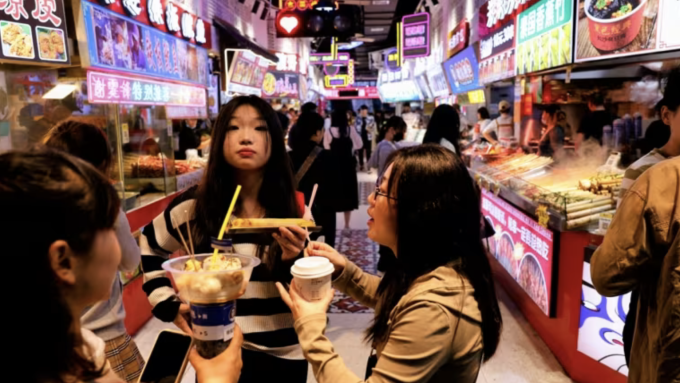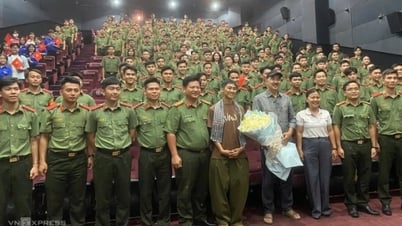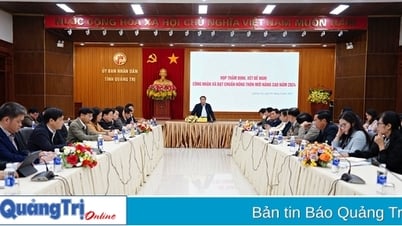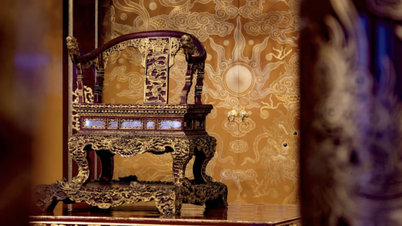Over the past year, a restaurant serving cheap meals for the elderly has become a familiar address for 24-year-old Zhang Ru.
“Eating here helps me keep my food expenses under 100 yuan (US$15) a day,” said Zhang, who works as a waitress at the restaurant. Young people like Zhang now make up about a third of the customers.
Zhang is a Gen Zer, people between the ages of 15 and 29. This generation is becoming a concern for marketers and policymakers. According to a recent joint study by the Tsinghua-Nikkei Media Research Institute, Gen Zers account for 18.4 percent of China's 1.4 billion population.
They are seen as the target consumer and child-rearing group of the future. But today they are facing many burdens due to slow economic growth and an aging population. The unemployment rate for 16- to 24-year-olds was more than 15% in February, much higher than the national average of 5.3%.

Young Chinese people choose a frugal lifestyle and limit spending to reduce economic pressure. Illustration photo: EPA-Yonhap
The phrases "reverse consumption", "living for oneself", and "living frugally" have become popular on Chinese social media, referring to the lifestyles of young people. They reflect how young people have grown up in an era of economic development and rising living standards and tend to spend more wisely.
Biao Xiang, a China researcher at Germany's Max Planck Institute, said the trend is driven by a sense of uncertainty about the future, doubt and disillusionment.
But those fears and frustrations are manifesting themselves in a variety of ways, including finding deals on e-commerce platforms. Online app Soul, which has 80% of its Gen Z users, has identified frugality and living for yourself as key trends for 2024.
Soul's report also pointed out keywords associated with Gen Z such as "lazy health" - describing the desire to find cheap measures to improve health and get enough sleep or "speed travel " - referring to short trips, dense schedules to minimize time and money.
"As the frugal economy becomes more popular, activities like eating at community canteens and shopping at discount stores have become popular money-saving strategies," said Julienna Law, editor of the media outlet Jing Daily.
Catherine Lin, who works at a solar panel factory in Ningbo, China, is always on the lookout for discounted cakes. The 30-year-old said she loves cakes but doesn’t dare buy them because they are expensive. But these days, by searching for discount codes, Lin can buy a piece of cake for just 16 yuan instead of the 37 yuan listed in the store.
The downturn in consumer spending has had a profound impact on the economy, said Yong Chen, a tourism economist at EHL Hotel Business School in Switzerland. Many people are ordering takeout rather than eating out because it is cheaper and more convenient.

Young Chinese people are turning to cheap street food stalls instead of luxury stores to save money. Illustration photo: Reuters
Biao Xiang believes that Gen Z may have had the happiest childhood in Chinese history in terms of material things. But as they grow up, they also suffer a lot of mental stress under the expectations of their parents to succeed. This has made experts worry that many young people are gradually becoming introverted and actively seeking their own path.
Xiaozhu, a home-sharing service, saw a 24-fold increase in searches for temple stays among young people during the Lunar New Year.
Nowadays, staying at temples and pagodas has become an alternative to hotels because it is cheap and can relieve the spirit. A night here can cost only about 80 yuan, including early morning meditation sessions.
Temple accommodation also attracts young people like Shirley Zuo, who quit her job out of fear for her future. Last year, she spent a night as a volunteer at a monastery in Chang’an, northern China. She said it was an escape from reality and a quiet environment to reflect on things.
While young people choose to live frugally, Chinese policymakers are doing everything they can to ensure that the younger generation earns and is willing to spend.
Minh Phuong (According to Nikkei )
Source





































































































Comment (0)